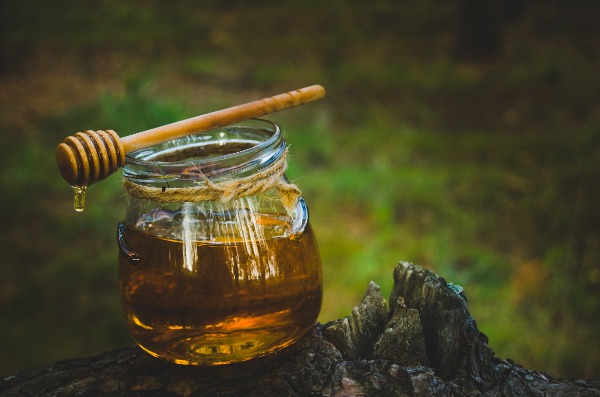Honey For Cold Sores (Herpes)
Honey has been used for centuries as a treatment for wounds, but is honey an effective treatment against cold sores (herpes)?
Three scientific papers suggest it could be (also, see the reader testimonials below).
About Cold Sores
It is estimated that about 67% of the world’s population has
the HSV-I virus that causes oral cold sores1.
Although most of these people only have cold sores 1-2 times per year, about 10% have 6 or more recurrences each year2.
“Cold sores are uncomfortable, negatively affect aesthetics, and can be considerably embarrassing, creating a psychosocial impact that affects the quality of life of these patients.”
- Naik et al3
Conventional medical treatment of cold sores usually involves application of anti-viral creams such as acyclovir or famciclovir, or non-steroidal anti-inflammatory agents to reduce pain.
However, they require frequent application and may only get rid of cold sores by just one day sooner than if left alone4:
“Studies have shown that they can make cold sores go away about one day sooner. They can also reduce the severity of symptoms somewhat.
For them to be able to work, they have to be applied to the affected area every 2 to 3 hours during the daytime. The treatment lasts five days.”
– National Library Of Medicine, USA4.
Could Honey Be More Effective As A Treatment For Cold Sores?

Cold sores around the mouth (labial herpes) are caused by the herpes simplex virus (there are two strains, known as HSV-1 and HSV-2).
They usually occur on the edge of the lips, and start with a tingling sensation. Sores then appear, which are fluid filled. Scabs can form a little later.
As I write, 3 published studies (in 2001, 2011 and 2021) suggest that honey could be effective for the treatment of cold sore symptoms.
This is interesting given honey's efficacy in wound care.
Al Waili et al 2004
In 2004, a study by Al Waili et al5 compared the
use of honey with acyclovir cream for the treatment of
recurrent labial herpes (cold sores around the mouth) and genital herpes
simplex lesions.
This was a small study (16 patients – 8 with labial herpes; 8 with genital herpes), but patients were treated alternately with honey and then acyclovir – i.e. the patients would be treated with honey for one attack and then with acyclovir for the next attack.
It was found that for all the measures in the study, honey performed better than acyclovir by the following percentages:
- duration of attacks: 35%
- pain: 39%
- occurrence of crusting: 28%
- mean healing time 43%
Therefore, according to the study, honey generated better results than the acyclovir for
cold sores (the results for genital herpes were more significant but beyond the
scope of this page).

Ghapanchi et al 2011
In a 20116 in vitro study conducted in a virology
laboratory, scientists analysed the effects of commercial honey on the cold
sore virus using honey at varied
concentrations (between 1% to 50%).
The virus was cultivated on laboratory microwell plates.
What Are Microwell Plates?
Microwell plates are laboratory equipment that consist of a plate with multiple cavities (wells) used as small sample tubes. These are used in analytical research and clinical diagnostic testing laboratories.
The researchers found that:
- if honey was added to the cold sore virus at 5% concentration or higher, simultaneously or within an hour of introducing the cold sore virus to the microwell plate, then the cold sore virus was completely inhibited;
- if honey was added one hour after introducing the cold sore virus to the microwell plate, again, the cold sore virus was completely inhibited, provided that the honey was at concentrations of 30% or higher;
- a control solution using carbohydrate had no inhibitive effect on the virus.
The researchers concluded that:
“In the present study, we showed that honey at different concentrations could inhibit the growth of HSV1, so it can be considered as a therapeutic choice in folk medicine”.
Naik et al 2021
In 2021, Naik et al3 examined the use of a product known as 'L–mesitran
Slow'.
L–mesitran Slow is a ‘Medical Grade Honey’ (MGH) preparation combined with vitamin C and vitamin E, which are both antioxidants.
The study recruited 29 patients, most of whom experienced at least 4 episodes of cold sore each year.
During the trial, patients used the honey product to treat an episode of cold sore, followed by treating their cold sore with their usual treatment for their next cold sore.
Results:
- Average absolute healing time was 72.4% slower with
conventional treatments than with honey (average 5.8 days with honey, compared to 10 days with
conventional treatment).
- Pain scores were reported as lower when the honey
treatment was used, by 72.7% of patients.
- Itching was reported as less by 71.4% of patients when the
honey product was used.
- 100% of patients reported a preference for the honey treatment over their conventional treatment.
Thus, the authors of the study describe the MGH combination product used as:
“a potent alternative treatment for treating cold sores, likely due to the combination of antiviral and wound healing activities”.
Honey and other skin conditions
Honey is acidic. It's antibacterial properties may play a part in fighting infections (as with wound care).
Furthermore, there is some evidence that honey might be effective against eczema.
Personal testimonials
I received the following messages from readers. Thanks for sharing to Leanne and Corinne!
Hi
I read your page and decided to try honey the very next time I had a cold sore, because I usually get several during the year, maybe only two cold sores but sometimes as many as four in a year.
It was just clear honey that I used, and I applied it on its own regularly through the day (using a little tissue paper), directly onto the cold sore.
It helped ALOT!
It was definitely less painful than usual. The appearance was SIGNIFICANTLY better, which was important for me because I usually turn into a recluse for the duration of the sore.
The reason it looked so much better was because of the lack of scabs, so it was harder to see.
I will definitely stick with honey as my treatment in future, whenever I get a cold sore.
I thought I would share this for the benefit of your readers.
Leanne J., UK.
Just to say I used honey (just normal pure honey) on a cold sore and it worked. Stopped the pain immediately and the cold sore was nowhere near as bad.
But after a couple of days I felt the honey was drying the cold sore, and so I swapped to using vitamin E oil instead.
This worked a treat. So for all sufferers out there, try honey for a couple of days, then switch to vitamin E oil. It worked for me.
Best,
Corinne
References
1. James C., Harfouche M., Welton N.J., Turner K.M., Abu-Raddad L.J., Gottlieb S.L., Looker K.J. Herpes simplex virus: Global infection prevalence and incidence estimates, 2016. Bull. World.
2. Cernik C., Gallina K., Brodell R.T. The treatment of herpes simplex infections: An evidence-based review. Arch. Intern. Med. 2008; 168:1137–1144. doi: 10.1001/archinte.168.11.1137.
3. Naik P P et al Medical-Grade Honey Outperforms Conventional Treatments for Healing Cold Sores—A Clinical Study Pharmaceuticals (Basel). 2021 Dec; 14(12): 1264 Health Organ. 2020; 98:315–329. doi: 10.2471/BLT.19.237149.
4. InformedHealth.org [Internet]. Cologne, Germany: Institute for Quality and Efficiency in Health Care (IQWiG); 2006-. How effective are creams and tablets for the treatment of cold sores? 2018 Jul 12. Available from: https://www.ncbi.nlm.nih.gov/books/NBK525789/.
5. Al-Waili N.S. Topical honey application vs. acyclovir for the treatment of recurrent herpes simplex lesions. Med. Sci. Monit. 2004;10:MT94–MT98.
6. Ghapanchi J., Moattari A., Andisheh Tadbir A., Talatof
Z., Pour Shahidi S., Ebrahimi H. The In Vitro Anti-Viral Activity of Honey on Type 1 Herpes Simplex
Virus. Aust. J. Basic Appl.Sci. 2011; 5:849–852.
If you found this page helpful or interesting, I'd really be grateful if you would share it with others - if not this page, perhaps another, such as Gardening For Bees.
Thank you so much :) .